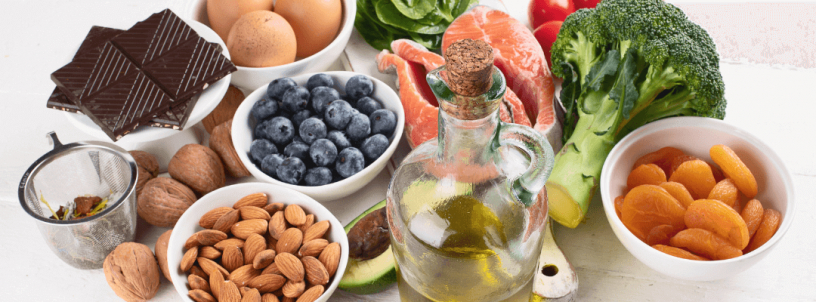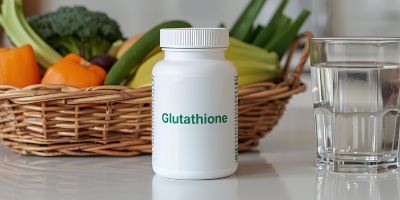Can Nutrition Affect Your Mental Health?
Eating healthy foods is really good for you, both physically and mentally. It’s science. Studies show that people who eat nutritious foods tend to have fewer mood swings and feel happier overall. [11]
Making your health a priority can be tough, but you don’t have to go it alone. In this article, we’ll explore the link between nutrition and mental well-being, and offer tips on how to get back on track.
The Psychology of Nutrition: What You Need to Know
Your diet is essential for your overall health and well-being, including your mental health. It’s all connected! Take a look:
Your gut and brain are connected in a two-way street called the gut-brain axis. Trillions of tiny microbes live in your gut, and the food you eat can directly affect their health. These microbes produce neurotransmitters, which are chemical messengers that send signals to your brain. This means that poor food choices can affect your mood, sleep, pain, appetite, and more.
In other words, your gut health is essential for your overall well-being. Eating a healthy diet rich in fruits, vegetables, and whole grains can help to keep your gut microbiome balanced and your brain healthy. [11]
Your gut is a major producer of serotonin, a neurotransmitter that plays a key role in mood, sleep, appetite, and pain. In fact, 90-95% of your body’s serotonin is made in your gut. As we mentioned above, the gut microbiome is a key player in gut-brain communication. Serotonin is produced primarily in the intestines—which means your mood can depend upon your gastrointestinal health. [4], [5]
Eating Well for Mental Health: Tips & Tricks
If you are experiencing symptoms of a mental health condition, please reach out for help immediately. There are many resources available to you, including individual care from psychiatrists and psychologists, the 988 Suicide and Crisis Lifeline, and other support groups and communities. You are not alone.
Here are a few of our top tips for making lifestyle changes to support your emotional well-being:
- Load up on Hearty Nutrients
Recent research has shown that certain nutrients can have a positive impact on mental health. Here are a few examples, along with some of the foods they are found in: [10]
- Omega-3 fatty acids: Fatty fish like salmon, tuna, and mackerel, as well as nuts and seeds like chia seeds and flaxseeds.
- B vitamins: Whole grains, legumes, leafy green vegetables, and nuts and seeds.
- Vitamin D: Fatty fish, eggs, and fortified milk.
- Magnesium: Leafy green vegetables, nuts and seeds, and whole grains.
- Zinc: Oysters, beef, and poultry.
In addition to the nutrients listed above, there are other nutrients that are important for mental health, such as iron, folate, and selenium. It is important to eat a balanced diet that includes a variety of foods to ensure that you are getting all of the nutrients you need!
What Else Do the Experts Say About Food for Your Mood?
Nutritional guides and experts recommend that you: [10]
- Eat plenty of whole fruits & vegetables. Fruits and vegetables are packed with nutrients that are essential for good mental health, such as fiber, complex carbohydrates, vitamin B, vitamin C, and polyphenols. Aim to eat a variety of fruits and vegetables, including berries, citrus fruits, and leafy greens.
- Choose whole grains over refined grains. Whole grains are a good source of fiber, which can help to regulate your mood and energy levels. Refined grains, on the other hand, have been stripped of their fiber and nutrients. Some examples of whole grains include brown rice, quinoa, and oats.
- Limit processed foods. Processed foods are often high in unhealthy fats, added sugar, and salt. These foods can have a negative impact on your mood and mental health. It’s best to limit your intake of processed foods and choose whole, unprocessed foods whenever possible.
- Cut back on alcohol. Alcohol can interfere with sleep and worsen mental health problems such as depression and anxiety. It’s best to limit your alcohol consumption or avoid it altogether.
- Eat regular meals & snacks. Skipping meals and snacks can lead to low blood sugar levels, which can cause mood swings and irritability. Aim to eat three meals and two snacks per day at regular times.
- Make small changes gradually. Don’t try to change your diet all at once. Start by making small changes, such as adding a piece of fruit to your breakfast or replacing soda with water. Once you’ve made those changes, you can gradually make more changes to your diet.
- Eat mindfully. Pay attention to how certain foods and drinks make you feel. If you notice that a particular food or drink makes you feel sluggish or irritable, try to avoid it. Instead, focus on eating foods that make you feel good and energized.
Craving a treat after all that healthy eating? Dark chocolate is the perfect option! It has been shown to reduce symptoms of anxiety and stress, and it’s also delicious. Here is a savory-sweet (and super simple) recipe for dark chocolate bark: [9]
INGREDIENTS
- 70% Cacao to 90% Dark Chocolate
- Avocado Oil
- Mixed Fruit & Dried Nuts (Pecans, Pistachios, Dried Cranberries, etc.)
- Sea Salt
INSTRUCTIONS
- To make chocolate bark, melt chocolate in a microwave-safe bowl in 30-second intervals, stirring after each, until melted. Stir in oil.
- Pour melted chocolate mixture into a wax-paper-lined 8-inch square pan and sprinkle with toppings of your choice.
- Cover with plastic wrap and freeze until chocolate hardens (about 30 minutes).
- Cut into squares or triangles and serve.
Add Supplementation to Your Diet
Getting your daily vitamins and minerals from food is the best way to do it, but supplements can be a helpful addition to your diet. [6] Supplements can help you improve or maintain your overall health and meet your daily nutrient needs. [7]
Supplements can be especially important for people with nutritional gaps or deficiencies in specific vitamins or minerals. Research has shown that supplements can be beneficial for people who: [8]
- Growing children and teens
- People with dietary restrictions that limit their access to a full range of nutrients
- Pregnant and breastfeeding women
- Older adults who experience a decline in essential vitamins and minerals with age
- People with certain medical conditions that restrict their diet
- People who do not have access to fresh and healthy foods
We recommend talking to your doctor before starting any new supplements.
For beginners, we recommend trying out a Probiotic to promote a healthy gut and feel your best!
Here are a few other supplement goodies you can try to support your overall wellness:
- Turmeric Curcumin | Joint, Body, and Cognitive Support
- Daily Multivitamin | All-in-One Health Support
- Ashwagandha Complex | Stress and Mood Support
- Maca Root | Sexual Health and Fertility Support







Leave a Reply